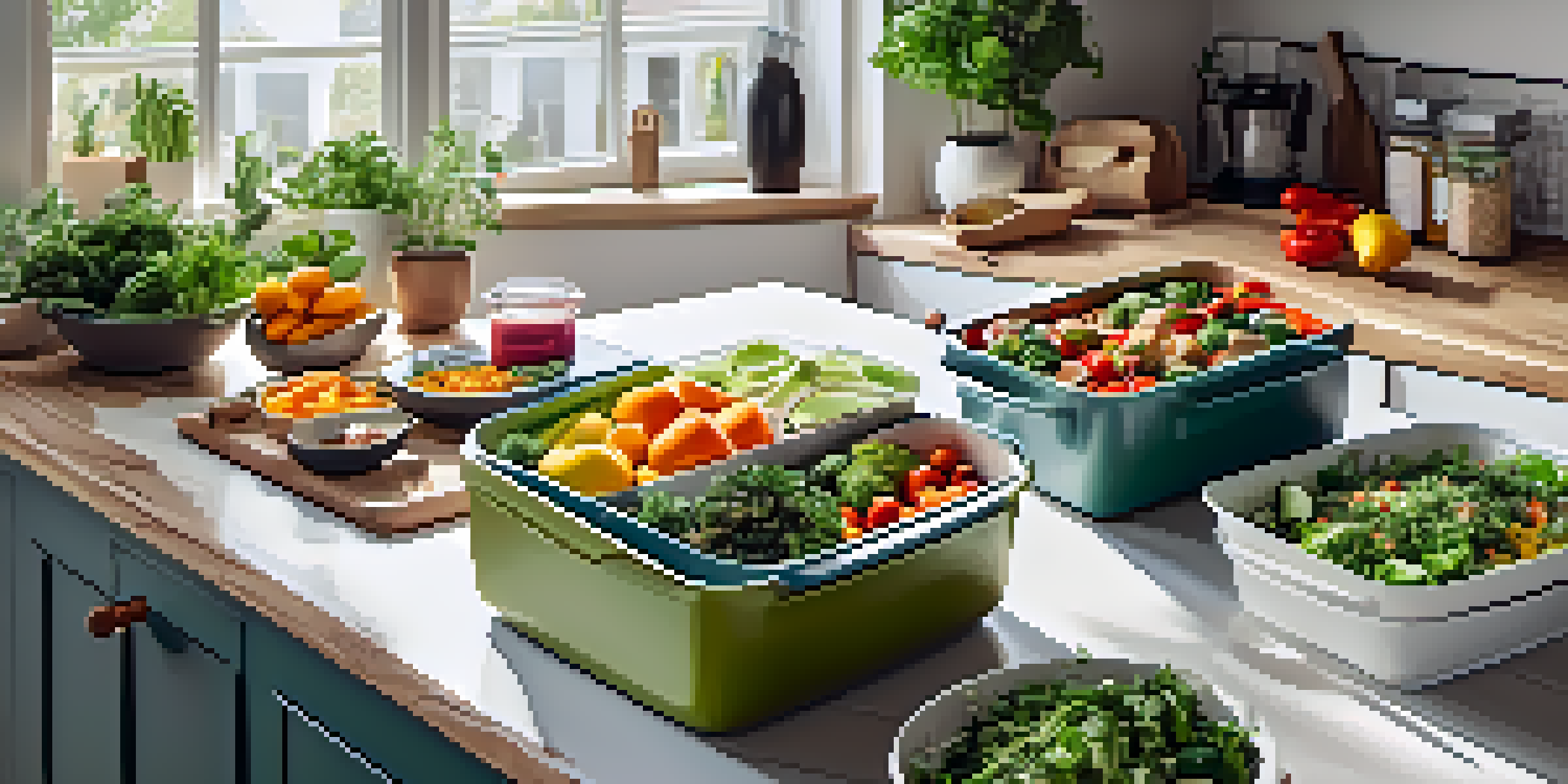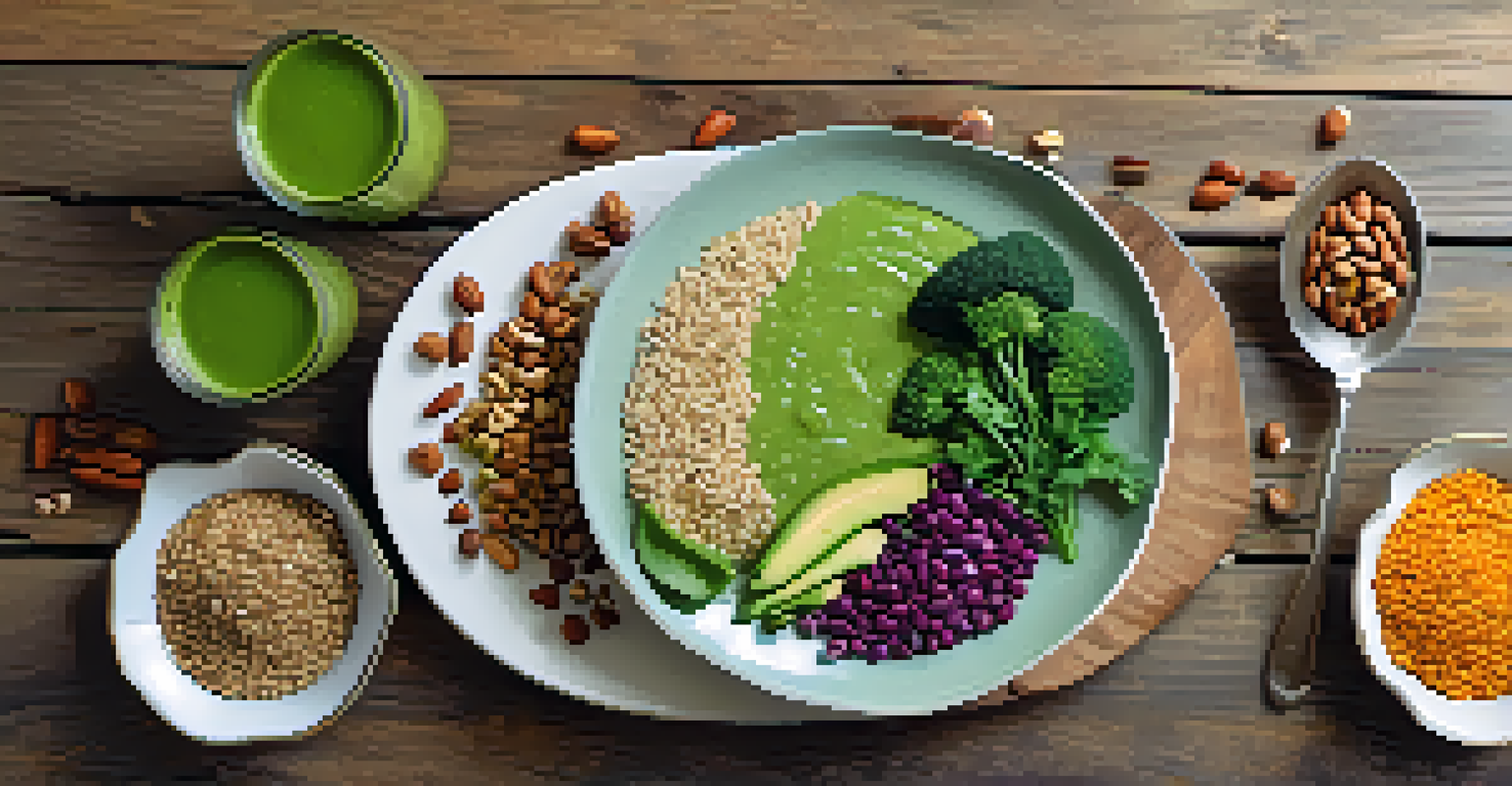Meal Planning Tips for Vegan Weight Loss Success

Understanding the Basics of Vegan Meal Planning
Before diving into meal planning, it's essential to understand what a vegan diet entails. A vegan diet excludes all animal products, focusing instead on plant-based foods like fruits, vegetables, grains, nuts, and legumes. This shift not only benefits your health but also contributes to environmental sustainability.
The food you eat can be either the safest and most powerful form of medicine or the slowest form of poison.
Meal planning helps streamline your grocery shopping and ensures you have nutritious meals ready to go. By planning ahead, you can avoid last-minute fast food runs that often lead to unhealthy choices. It also allows you to experiment with new recipes, keeping your meals exciting and satisfying.
Additionally, understanding portion sizes and nutritional needs is crucial for weight loss success. Incorporating a variety of food groups into your meal plan ensures you get the necessary vitamins and minerals while keeping your calorie intake in check.
Setting Realistic Weight Loss Goals
When embarking on a weight loss journey, it's important to set achievable goals. Instead of aiming for drastic changes, consider small, incremental goals that are more sustainable in the long run. For example, losing one to two pounds per week is a healthy target that allows your body to adjust gradually.

You might also want to focus on non-scale victories, such as increased energy levels or fitting into clothes better. These milestones can boost motivation and reinforce your commitment to a healthier lifestyle. Remember, it’s about progress, not perfection.
Plan for Vegan Meal Success
Meal planning ensures you have nutritious, plant-based meals ready, avoiding unhealthy last-minute choices.
Tracking your progress, whether through a journal or an app, can help you stay accountable. Documenting your meals and workouts not only makes you more mindful of your choices but also highlights patterns that can inform future meal planning.
Creating a Balanced Vegan Meal Plan
A balanced vegan meal plan should include a variety of foods to ensure you are meeting your nutritional needs. Aim to incorporate whole grains, legumes, healthy fats, and plenty of fruits and vegetables into your meals. This diversity will help keep you satisfied and prevent cravings.
To eat is a necessity, but to eat intelligently is an art.
Consider using the plate method: fill half your plate with vegetables, a quarter with whole grains, and a quarter with plant-based protein. This simple visual can help you create balanced meals without overthinking it. Plus, it makes your meals visually appealing!
Don’t forget to include healthy snacks in your meal plan. Having options like hummus and veggies, fruit, or nuts on hand can prevent unhealthy snacking and keep your energy levels steady throughout the day.
Batch Cooking for Time Efficiency
Batch cooking is a game changer when it comes to meal planning, especially for busy lifestyles. By preparing meals in larger portions ahead of time, you can save both time and effort during the week. Think of it as cooking once and eating multiple times.
Start by choosing a few recipes that can be made in bulk, such as soups, stews, or grain-based dishes. Store them in the fridge or freezer in individual portions, ready to be enjoyed whenever you're pressed for time. This practice not only reduces cooking time but also minimizes food waste.
Set Achievable Weight Loss Goals
Focusing on small, incremental goals helps create sustainable weight loss and keeps you motivated.
Additionally, batch cooking allows you to explore new flavors and ingredients without the pressure of daily cooking. You might find new favorites that you can rotate into your meal plan, keeping your diet diverse and enjoyable.
Incorporating Nutrient-Dense Foods
When planning your meals, focus on incorporating nutrient-dense foods that provide a lot of vitamins and minerals without excess calories. Foods like leafy greens, quinoa, lentils, and avocados are excellent choices that can enhance your meals both in taste and nutrition.
These foods not only support your weight loss goals but also promote overall health. For example, leafy greens are low in calories but high in fiber, which helps keep you full longer. Similarly, incorporating a variety of colorful fruits and vegetables ensures you are getting a wide range of nutrients.
Experimenting with different cooking methods can also enhance the flavors of these nutrient-dense foods. Roasting vegetables or making a hearty salad can turn simple ingredients into something delicious and satisfying.
Mindful Eating Practices
Mindful eating is a powerful practice that can greatly enhance your weight loss efforts. It involves paying full attention to the experience of eating, from the taste and texture of food to your body’s hunger cues. This practice can help prevent overeating and encourage a healthier relationship with food.
To practice mindful eating, try putting away distractions such as your phone or TV during meals. Focus on your food, savor each bite, and notice how it makes you feel. This can help you enjoy your meals more and recognize when you’re truly satisfied.
Embrace Batch Cooking Techniques
Batch cooking saves time and reduces food waste, allowing you to enjoy diverse, home-cooked meals throughout the week.
Additionally, consider taking smaller bites and chewing slowly. This not only aids digestion but also gives your brain time to register that you’re full, which can prevent unnecessary snacking later on.
Staying Motivated and Accountable
Staying motivated on your vegan weight loss journey can be challenging, but having a support system can make a world of difference. Consider joining a local or online vegan community where you can share experiences, recipes, and tips. Surrounding yourself with like-minded individuals can keep you inspired and accountable.
Setting up regular check-ins with friends or family members who are supportive of your goals can also help. Whether it’s sharing meal ideas or discussing challenges, these conversations can provide valuable encouragement. Plus, it makes the journey feel less lonely.

Lastly, don’t be too hard on yourself if you hit a plateau or stray from your plan. Remember, every step counts, and it’s all part of the learning process. Celebrate your successes, no matter how small, and keep moving forward!